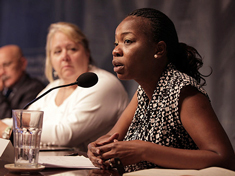-
Quality vs. Quantity: Faith Muigai on Providing Antenatal Care in Nairobi
July 18, 2014 By Sarah Meyerhoff
In the quest to improve maternal health care for the world’s poorest women, getting more mothers into clinics for regular check-ups during pregnancy is often trumpeted as a critical starting point. But delivering antenatal care to women in low-resource settings is as much about quality as it is about quantity, says Faith Muigai in this week’s podcast.
In the quest to improve maternal health care for the world’s poorest women, getting more mothers into clinics for regular check-ups during pregnancy is often trumpeted as a critical starting point. But delivering antenatal care to women in low-resource settings is as much about quality as it is about quantity, says Faith Muigai in this week’s podcast.
Between research and policy, there’s a middle piece that’s missing and that’s implementationThrough her work as the director of clinical operations at Jacaranda Health in Kenya, Muigai hopes to “transform maternal health care in Africa.” Jacaranda began as a for-profit mobile outreach enterprise to provide antenatal care services and education to women in local markets, churches, and women’s groups. Four years later, Jacaranda boasts two care centers in Nairobi that help women through delivery and together provide outpatient care to 600 women every month.
Between research and policy, “there’s a middle piece that is missing and that’s implementation,” says Muigai. “This is where I feel that Jacaranda fits in: a means of proving concepts that impact the delivery of cost-effective, patient-centered, quality care in low-resource settings.”
Jacaranda serves women in peri-urban settings who do not access to care for a variety of reasons: some lack transportation or money; others, an understanding of the importance of antenatal care or adequate decision-making power in their families.
The typical Jacaranda patient is “the woman who traditionally cares for others – her children, her partner, her spouse – but has not set a minimum standard in terms of accessing quality services for herself,” says Muigai. She is usually not the primary decision-maker in her household, so receiving antenatal care services – and high quality services at that – are rarely priorities. Instead, many women wait until delivery to visit a clinic for the first time.
Happy Doctors Make for Happy Patients
Though Jacaranda is for profit, they are working specifically to reach underprivileged women as clients and make their services affordable, Muigai says, who worked in hospitals in the United States before moving to Kenya. They can often do so more effectively than public clinics, she says, because the legally mandated free services these clinics provide leave them strapped for resources, inefficient, and staffed by overwhelmed doctors and midwives.
These improvements satisfy not only patients, but staff as well, who in turn deliver more consistent, higher-quality care.Through what Muigai describes as a patient-centered care model, Jacaranda works to increase the quality of antenatal care by analyzing client satisfaction through surveys and creating standards that eliminate inefficiencies for women who lack time and resources. They have also streamlined the training of care providers and are using mobile technology to help patients manage their appointment schedules, stay informed, and save money on delivery fees, she says. These improvements satisfy not only patients, but staff as well, who in turn deliver more consistent, higher-quality care.
Besides improving quality, Muigai hopes that they can help change the family dynamics that keep women from accessing care. “We have been thoughtful about male engagement early in the pregnancy to drive positive decisions about accessing [antenatal care] early and choosing a place for delivery,” she says. “This has included personalized invitations to our clients’ partners [and] education materials on what to expect when she’s expecting and financial options.”
In the end, however, Muigai’s best tool for bringing in new patients may be her past clients. “By building a passionate, talented, and committed workforce, we’re able to service our clients,” she says. “These clients in turn steer the community towards the quality service we provide. We see women and children every day and we’re positively changing their stories, and in turn, the stories of families and communities.”
Muigai spoke at the Wilson Center on June 30. Download her slides to follow along.
Friday podcasts are also available for download on iTunes.
Topics: Africa, development, Dot-Mom, economics, Friday Podcasts, gender, global health, Kenya, maternal health, mobile technology, podcast, poverty
 A Publication of the Stimson Center.
A Publication of the Stimson Center.







